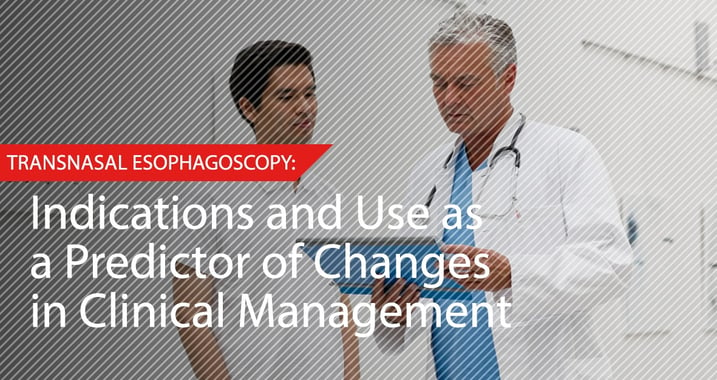
Transnasal esophagoscopy (TNE), a technique used to examine the upper aerodigestive tract under topical anesthesia, has grown in popularity over the last decade. Studies have demonstrated the safety, ease of use, and diagnostic accuracy of this technique for head and neck cancer screenings, biopsies of known lesions, and the evaluation of dysphagia, esophageal stricture, and tracheoesophageal puncture. Positive findings on TNE ranged from 43-50% in several studies. Additionally, the American Broncho-Esophagological Association (ABEA) has cited the superiority of TNE to conventional esophagoscopy in terms of image quality, cost savings, and patient satisfaction.
Study Objective:
Despite the wide acceptance of TNE among otolaryngologists, indications for its use have not been well-defined. This study is the first of its kind to aim to establish standardized guidelines for TNE use based on its efficacy in different patient populations with various clinical diagnoses.
Methods:
This multicenter, prospective, cohort study was conducted from 2012 to 2015. It included 319 adult patients (median age 55) across four tertiary referral centers (three academic and one private practice) in the United States. Patients were scheduled to undergo TNE for the evaluation of dysphagia, persistent laryngopharyngeal reflux (LPR) symptoms for >3 months, or head and neck cancer (HNCA).
The study’s outcome measure was defined as “findings that resulted in changes in management” (FCIM). A change in management occurred when a new medication was prescribed, a referral was made, or surgery was recommended. Patients found to have FCIM on TNE were compared to those whose TNE findings did not alter management; the two groups were compared across several parameters, including clinical indications and endoscopic findings.
Results:
Patients in the FCIM and non-FCIM groups did not differ based on gender, BMI, age, race, or tobacco use. They did differ in terms of proton pump inhibitor (PPI) use prior to TNE: patients with no prior use were likely to have a change in management, patients taking a daily PPI were equivalent, and patients taking a twice-daily PPI were unlikely to have a change in management (P=0.006).
A total of 162/319 patients (51%) were found to have FCIM on TNE. Common FCIM were irregular Z-line (27.4%), reflux esophagitis (12.8%), esophageal stricture (7.5%), and infectious esophagitis (6.3%) (P <0.001-0.010). Patients presenting with globus (P=0.007); throat clearing or dysphonia (P=0.001); or cough, dysphagia, LPR, or HNCA (P<0.001) were likely to have FCIM.
Male gender and elevated body mass index (BMI) were significantly predictive of a positive TNE (P=0.013-0.045). Patients with a history of HNCA had a positive TNE 64% (N=43/67) of the time, and patients with both HNCA and dysphagia had FCIM on TNE 81% (N=29/36) of the time.
Discussion:
This study demonstrates that male gender and elevated BMI significantly increase the risk for FCIM on TNE; these results correlate with the American Gastroenterological Association (AGA) guidelines that call for Barrett’s esophagus screening in these patients. Furthermore, a negative TNE could be used for the de-escalation of PPI therapy, given that patients on a twice-daily PPI prior to TNE were unlikely to have a positive TNE.
Patients presenting with sore throat, heartburn, or odynophagia were unlikely to have FCIM on TNE. On the contrary, patients with globus, cough, dysphagia, throat clearing, LPR, dysphonia, and HNCA were more likely to have FCIM, though these were not statistically significant.
Examining the correlation of symptom duration with positive TNE findings would be one topic for future research. Another area for further study would be the utilization of TNE in the HNCA population worldwide; although TNE was shown to be advantageous in this American study’s HNCA population, the small cohort of patients limited the statistical power of the results.
Conclusion:
Male gender and elevated BMI are predictive of an FCIM-positive TNE, irrespective of presenting symptoms. In addition, patients presenting with dysphagia or HNCA are likely to have FCIM on TNE assessment. PENTAX Medical encourages physicians to have a low threshold for performing TNE in such treatment-seeking patients whose findings are likely to result in a change in management.
Reference:
Rebecca J. Howell, MD; Mariah B. Pate, MD; Stacey L. Ishman, MD; Tova F. Isseroff, MD; Adam D. Rubin, MD; Ahmed M. Soliman, MD; Gregory N. Postma, MD; Michael J. Pitman, MD. “Prospective Multi-institutional Transnasal Esophagoscopy: Predictors of a Change in Management. The Laryngoscope 2016; 126: 2667-2671. Accessed December 14, 2016.
